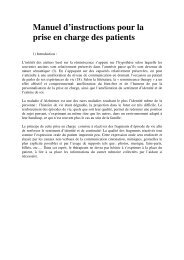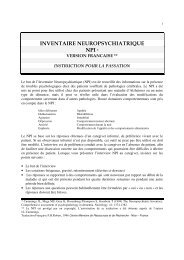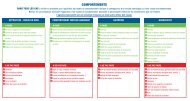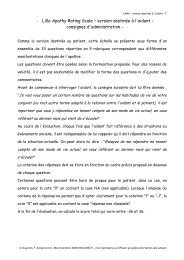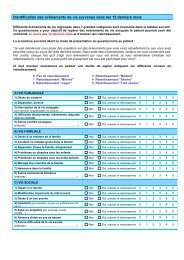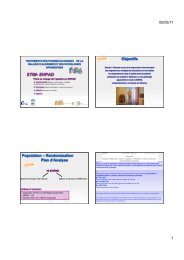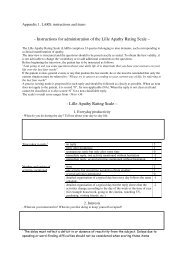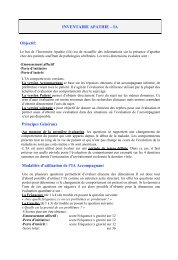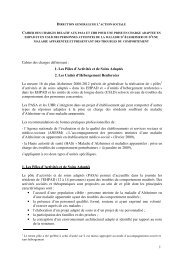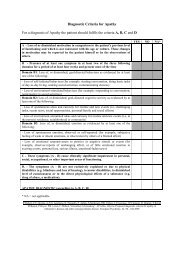ANNALS of NeurologyOur approach provides separate <strong>criteria</strong> in the behavioral<strong>and</strong> cognitive domains. This was based on previousreports of dissociated disorders, usually presentingwith behavioral disorders unaccompanied by cognitivedisorders. 5,7 The present results, obtained in a largegroup of unselected patients with multiple diseases, supportthis position, <strong>and</strong> even revealed that a dissociateddisorder was more frequent than the combined behavioral<strong>and</strong> cognitive <strong>syndrome</strong>. This is consistent with experimentalneuropsychological studies showing prominentimpairment of working memory in dorsolaterallesions <strong>and</strong> prominent impairment of behavioral processesin mediofrontal lesions. 5,7,30 On clinical grounds,the prominence of behavioral impairment has already beenreported in mediofrontal damage, 5,7,30 but the reverse patternremains rarely documented to our knowledge. 31 Thisindicates that both behavioral <strong>and</strong> cognitive domains mustbe examined in clinical practice whenever possible.The present <strong>criteria</strong> were strictly defined <strong>and</strong> operationalizedusing definite performance indices that havebeen previously normalized. In addition, the cutoff scoresof dysexecutive <strong>syndrome</strong> were adjusted for the number ofindices, <strong>and</strong> this provides a good specificity (
Godefroy et al: <strong>Dysexecutive</strong> SyndromeAuthorshipO.G. <strong>and</strong> M.R. designed the <strong>study</strong> <strong>and</strong> prepared thestatistical analysis plan. O.G. wrote the manuscript withassistance from P.A., P.R., M.R., T.M., <strong>and</strong> D.L.G. M.R.contributed to data analysis. O.G., M.R., P.A., P.R., M.R.,T.M., <strong>and</strong> D.L.G. identified patients or controls. All authorsreviewed the manuscript <strong>and</strong> approved the final draft.Potential Conflicts of InterestNothing to report.AppendixThe following centers <strong>and</strong> investigators participated inthe GREFEX cooperative <strong>study</strong> (n number of patientsincluded at each center; investigators): Amiens UniversityHospital (France) (n 183; O. Godefroy <strong>and</strong> M. Roussel),Angers University Hospital (France) (n 19; D. LeGall), Heliomarin Rehabilitation Center Berck (France)(n 15; C. Bertola), Bordeaux University Hospital(France) (n 28; J. M. Giroire <strong>and</strong> P. A. Joseph), SaintLuc University Hospital Brussels (Belgium) (n 6; X.Seron, F. Coyette), Cholet General Hospital (France) (n8; E. Bretault <strong>and</strong> I. Bernard), Ottignies William LennoxCenter (Belgium) (n 3; M. Leclercq), Garches UniversityHospital (France) (n 9; P. Azouvi <strong>and</strong> C. Vallat-Azouvi), Grenoble University Hospital (France) (n 24; P.Pollack <strong>and</strong> C. Mosca), Lausanne University Hospital(Switzerl<strong>and</strong>) (n 9; C. Bindschadler), Lay St. ChristopheRehabilitation Center (France) (n 3; M. Krier), LiègeDepartment of Cognitive Sciences (Belgium) (n 19; T.Meulemans <strong>and</strong> V. Marquet), Lille Stroke Center UniversityHospital (France) (n 26; D. Leys <strong>and</strong> M. Roussel),Nantes University Hospital (France) (n 8; P. Renou <strong>and</strong>M. Vercelletto), Nice University Hospital (France) (n 6;E. Michel <strong>and</strong> P. Robert ), Nîmes University Hospital(France) (n 15; P. Labauge <strong>and</strong> C. Franconie), Paris-LaSalpétrière University Hospital Neurology Department(France) (n 18; B. Pillon <strong>and</strong> B. Dubois), Paris-La SalpétrièreUniversity Hospital Geriatrics Department(France) (n 13; B. Dieudonnée <strong>and</strong> M. Verny), Paris-Broca University Hospital (France) (n 5; H. Lenoir <strong>and</strong>J. De Rotrou), Rouen University Hospital (France) (n56; D. Hannequin <strong>and</strong> S. Bioux), Sion RehabilitationClinic (Switzerl<strong>and</strong>) (n 12; J. Fuchs, A. Bellmann, <strong>and</strong>P. Vuadens).References1. Godefroy et Groupe de Réflexion pour l’évaluation des FonctionsEXécutives. Fonctions exécutives et pathologies neurologiques etpsychiatriques: évaluation en pratique clinique. Marseille, France:Solal, 2008.2. Luria AR. Higher cortical functions in man. New York, NY: BasicBooks, 1966.3. Lezak MD. The problem of assessing executive functions. Int JPsychol 1982;17:281–297.4. Baddeley A, Wilson B. Frontal amnesia <strong>and</strong> the dysexecutive <strong>syndrome</strong>.Brain Cogn 1988;7:212–230.5. Eslinger PJ, Damasio AR. Severe disturbance of higher cognitionfollowing bilateral frontal lobe ablation: patient EVR. Neurology1985;35:1731–1741.6. Groupe de Réflexion sur l’Evaluation des Fonctions exécutives.L’évaluation des fonctions exécutives en pratique clinique. RevNeuropsychol 2001;11:383–434.7. Godefroy O. Frontal <strong>syndrome</strong> <strong>and</strong> disorders of executive functions.J Neurol 2003;250:1–6.8. Godefroy O <strong>and</strong> the Groupe de Réflexion sur L’Evaluation desFonctions Exécutives. Frontal dysexecutive <strong>syndrome</strong>s. Rev Neurol2004;160:899–909.9. Folstein MF, Folstein SE, McHugh PR. Mini mental state: a practicalmethod for grading the cognitive state of patients for the clinician.J Psychiatr Res 1975;12:189–198.10. Petersen RC, Smith GE, Waring SC, et al. Mild cognitive impairment:clinical characterization <strong>and</strong> outcome. Arch Neurol 1999;56:303–308.11. McKhannG,DrachmanD,FolsteinM,etal.ClinicaldiagnosisofAlzheimer’s disease: report of the NINCDS-ADRDA Work Groupunder the auspices of Department of Health <strong>and</strong> Human ServicesTask Force on Alzheimer’s disease. Neurology 1984;34:939–944.12. Poser CM, Paty DW, Scheinberg L, et al. New diagnosis <strong>criteria</strong>for multiple sclerosis: guidelines for research protocols. Ann Neurol1983;13:227–231.13. McDonald WI, Compston A, Edan G, et al. Recommended diagnostic<strong>criteria</strong> for multiple sclerosis: guidelines from the InternationalPanel on the diagnosis of multiple sclerosis. Ann Neurol2001;50:121–127.14. Hughes AJ, Daniel SE, Blankson S, Lees AJ. A clinicopathologic<strong>study</strong> of 100 cases of Parkinson’s disease. Arch Neurol 1993;50:140–148.15. Weschler D. The Weschler Adult Intelligence Scale (manual). NewYork, NY: Psychological Corporation, 1955.16. Cummings JL, Mega M, Gray K, et al. The Neuropsychiatric Inventory:comprehensive assessment of psychopathology in dementia.Neurology 1994;44:2308–2314.17. Reitan RM. Validity of the Trail Making test as an indicator oforganic brain damage. Percept Mot Skills 1958;8:271–276.18. Stroop JR. Studies of interference in serial verbal reaction. J ExpPsychol 1935;18:643–662.19. Nelson HE. A modified card sorting test sensitive to frontal lobedefects. Cortex 1976;12:313–324.20. Cardebat D, Doyon B, Puel M, et al. Évocation lexicale formelle etsémantique chez des sujets normaux: Performances et dynamiquesde production en fonction du sexe, de l’âge et du niveaud’étude. Acta Neurol Belg 1990;90:207–217.21. Shallice T, Burgess PW. Deficits in strategy application followingfrontal lobe damage in man. Brain 1991;114:727–741.22. Burgess PW, Shallice T. Bizarre responses, rule detection <strong>and</strong> frontallobe lesions. Cortex 1996;32:241–259.23. Baddeley AD, Logie RH, Bressi S, et al. Dementia <strong>and</strong> workingmemory. Q J Exp Psychol 1986;38A:603–618.24. Van Swieten JC, Koudstaal PJ, Visser MC, et al. Interobserveragreement for the assessment of h<strong>and</strong>icap in stroke patients.Stroke 1988;19:604–607.December, 2010 863



